| | In this edition: US pauses Zimbabwe visas, a push for nuclear energy, Airtel closes gap on Safaricom͏ ͏ ͏ ͏ ͏ ͏ |
| |   Harare Harare |   Yaoundé Yaoundé |   Libreville Libreville |
 | Africa |  |
| |
|
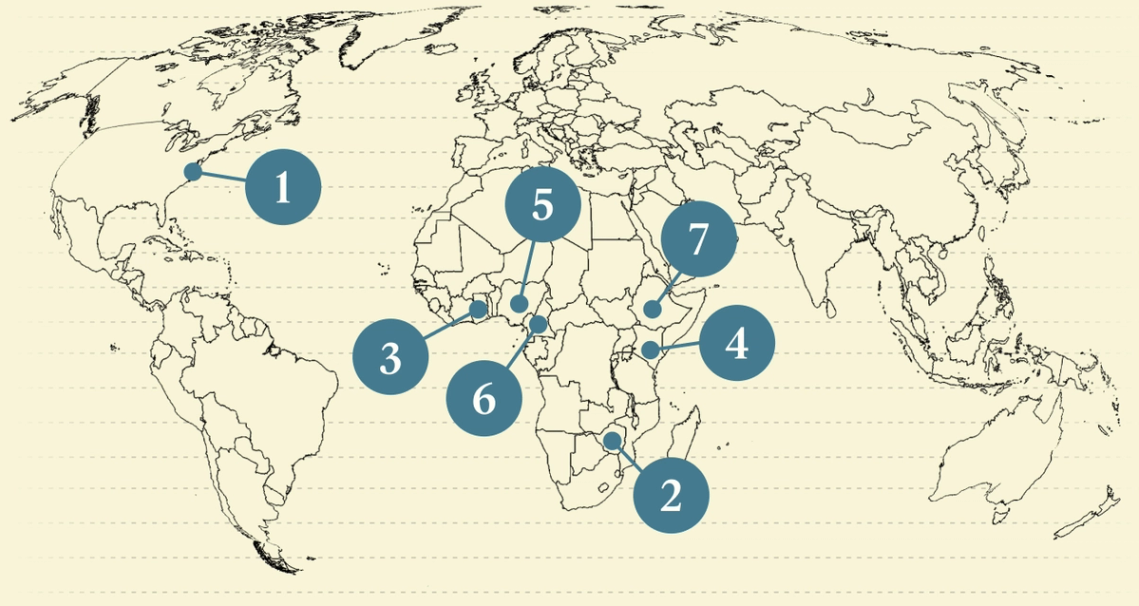 - US plans food aid
- Zimbabwe visa pause
- Nuclear ambitions
- Airtel eyes primacy
- Telecom vandalism in Nigeria
- Cameroon opposition blow
- Weekend Reads
 Scientists find traces of prehistoric life in a Gabon cave. |
|
US to send $93M in food aid |
| |  | Shelby Talcott |
| |
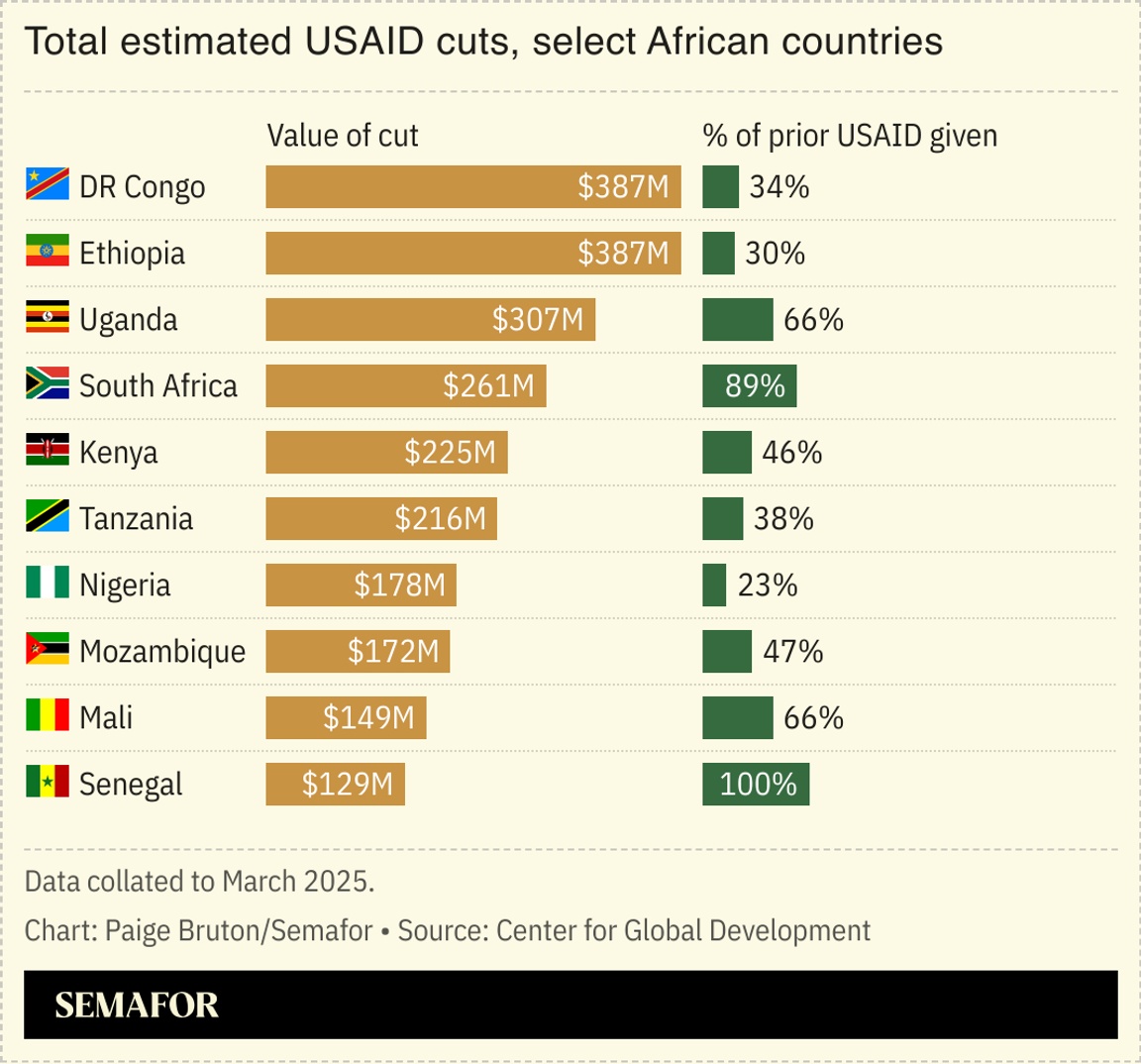 The US plans to provide $93 million in new food aid to 13 countries, a dozen of them in Africa. The aid will be focused on treating nearly 1 million children suffering from malnutrition in Central African Republic, Chad, Djibouti, DR Congo, Ethiopia, Kenya, Madagascar, Mali, Niger, Nigeria, South Sudan, and Sudan, the US State Department told Semafor. Haiti is the only non-African country on the list. It follows the Trump administration’s dismantling of the US Agency for International Development, which had played a key role in disbursing humanitarian assistance across Africa. It sparked widespread concern about the impact on food security and health care on the continent. In 2023, sub-Saharan Africa received around 40% of the USAID budget, while DR Congo, Ethiopia, South Sudan, and Sudan received more than one-fifth of their total development assistance from the now-defunct agency. |
|
| |  | Shelby Talcott |
| |
 US Secretary of State Marco Rubio. Umit Bektas/Reuters. US Secretary of State Marco Rubio. Umit Bektas/Reuters.The US embassy in Zimbabwe is pausing all routine visa operations. The hiatus came into effect on Thursday, according to a State Department memo viewed by Semafor. The pause, described as temporary, will affect a swath of applications, including those for immigrant visas and nonimmigrant tourist, business traveler, student, and exchange visitor visas. A senior State Department official told Semafor the administration is “working to prevent visa overstay and misuse,” pointing to Zimbabwe’s B1 and B2 visa overstay rate of 10.57% in 2023 (equivalent to 709 Zimbabweans). Harare has also not agreed to a “safe third country” or “third country national” deal of the type used by the Trump administration to get African countries to accept deported non-national migrants: Eswatini, Rwanda, and South Sudan have so far publicly agreed to do so. |
|
Ghana, Rwanda lead nuclear push |
| | Prashant Rao and Alexis Akwagyiram |
| |
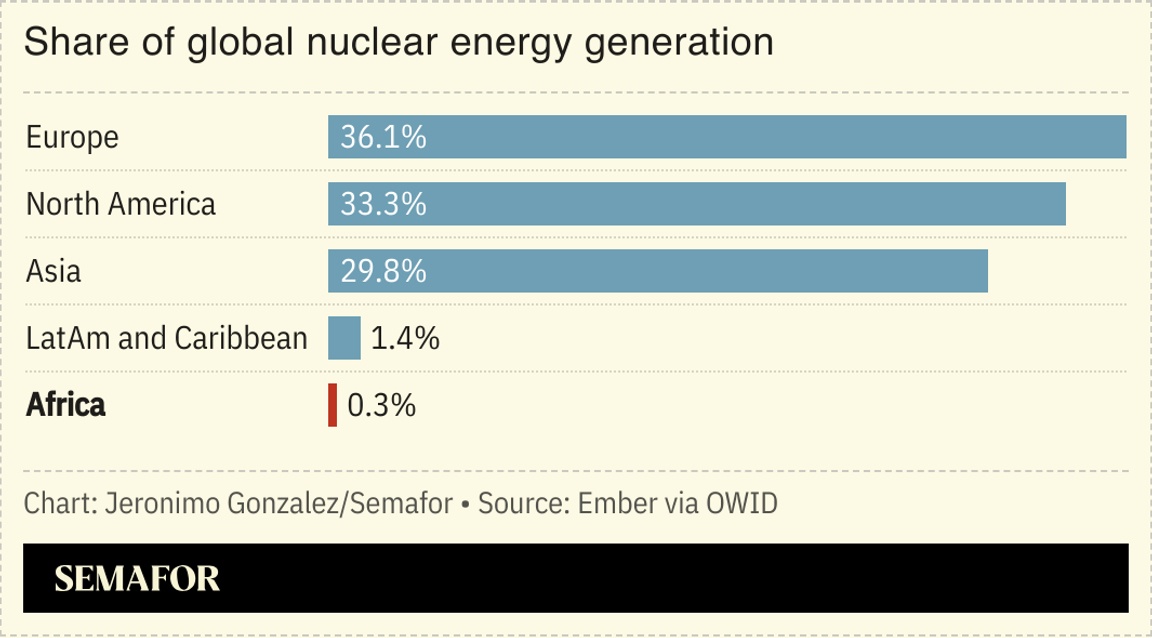 Ghana and Rwanda are leading the race to deploy Africa’s first small modular nuclear reactors, the head of the industry’s main global trade group said in an interview. South Africa is the only African country with its own nuclear power plants, and Egypt is building its own, but both have large-scale, traditional facilities. And while several nations on the continent have expressed interest in deploying SMRs — newer technology that is more easily built and scaled — Accra and Kigali have taken the most aggressive steps to build such sites, Sama Bilbao y León, the director general of the World Nuclear Association, told Semafor. “We are going to need money, we are going to need supply chains, we are going to need work force, we are going to need many things to develop nuclear” in Africa, she said. “But the number one thing that we need is visionary leadership that knows, that has a plan, and moves forward.” |
|
Airtel closes gap on rival Safaricom |
| | 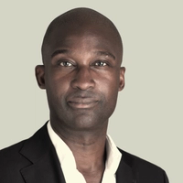 | Alexis Akwagyiram |
| |
 Simon Maina/AFP via Getty Images Simon Maina/AFP via Getty ImagesAirtel Africa’s Kenyan arm is accelerating a push to break Safaricom’s dominance in East Africa’s biggest economy, its managing director told Semafor. Kenya’s second-largest telecoms company grew faster than its larger rival in the first four months of this year. Airtel Kenya’s Managing Director Ashish Malhotra said he wanted to drive further growth by increasing his company’s network of mobile-phone towers — which have nearly doubled in the last three years — by around a third in the next three years, in order to extend the company’s reach into underserved rural areas. Malhotra also wants to double the company’s mobile money network within two years: Safaricom’s M-Pesa platform is by far Kenya’s most widely used mobile money service, but Malhotra said a change by the regulator to simplify transfers between different networks had helped to open up a “big” opportunity. |
|
Telecom vandalism rises in Nigeria |
 The number of cases of telecom infrastructure vandalism in Nigeria within an 88-day period this year, according to an industry association. The cuts to telecom cables have occurred at an alarming rate in 2025, the association said, leading to frequent disruptions to the internet and other mobile network services for consumers. Vandalism has become more frequent, involving up to five incidents per day, the association said, with Lagos and Abuja among the most affected regions in the country. A major concern is that alleged vandals have started to demand ransoms “before releasing stolen cables,” the association said, mirroring Nigeria’s endemic abduction-for-ransom crisis that the government has struggled to overcome. |
|
Person of Interest: Maurice Kamto |
 AFP via Getty Images AFP via Getty ImagesCameroonian opposition candidate Maurice Kamto this week lost his appeal to be put on the ballot for October’s presidential election. The former government minister and barrister was seen as the biggest rival to President Paul Biya’s bid for an eighth term in October’s vote. Following the last election in 2018, in which he came second to Biya, Kamto was imprisoned for nine months for organizing protests against the results. Cameroon’s electoral commission has not provided a reason for Kamto’s exclusion in this year’s vote. Biya, 92, is the world’s oldest serving head of state and has been in power since 1982. He is seeking reelection despite rumors that his health is failing. |
|
 - Concerns are rising that conflict could reemerge in Ethiopia’s northern Tigray region. The Tigray People’s Liberation Front, which governs the state, is increasingly cozying up to Eritrea, after years of hostilities, as tensions between Asmara and Addis Ababa grow. The TPLF is pursuing a philosophy of “the enemy of my enemy is my friend,” Gelila Enbaye argues for Africa Is a Country, with potentially dire consequences for the region.
- West Africans living around the shores of Lake Chad are facing dual threats: The rising waters of the lake caused by climate change, as well as the growing presence of the Islamist militant group Boko Haram. In a four-part series, Le Monde explores how rising water levels are reducing accessibility for NGOs, with extremist groups filling the gaps. Meanwhile, unpredictable flooding and droughts have left residents more vulnerable than ever. “The terrorists rule the water,” one displaced Chadian village chief told the outlet.
- Small boat fishermen in Abuja highlight the vast inequality resulting from Nigeria’s rapid urban development, France 24 writes. Speaking to men who make a living catching fish from wooden canoes on the river beneath the capital’s high-rise apartments, the article chronicles the stories of those working outside of Nigeria’s vibrant tech, oil, and finance sectors. “This is our job,” one fisherman said. “This is our business, this is the business our fathers have been doing, our parents have been doing.”
- While AI implementation in Africa is fraught with potential roadblocks, intelligent tech could be revolutionary for one cross-continent problem: Africa’s brain drain. In Rest of World, Samuel Alemayehu argues that AI has the potential to plug holes in systems hampered by a lack of skilled workers. Its solution is in its scalability: “Imagine a health worker in rural Uganda using an AI diagnostic app to monitor chronic conditions across an entire district, or an agronomist in Ethiopia leveraging drones and AI to advise hundreds of farmers each week on crop disease.”
|
|
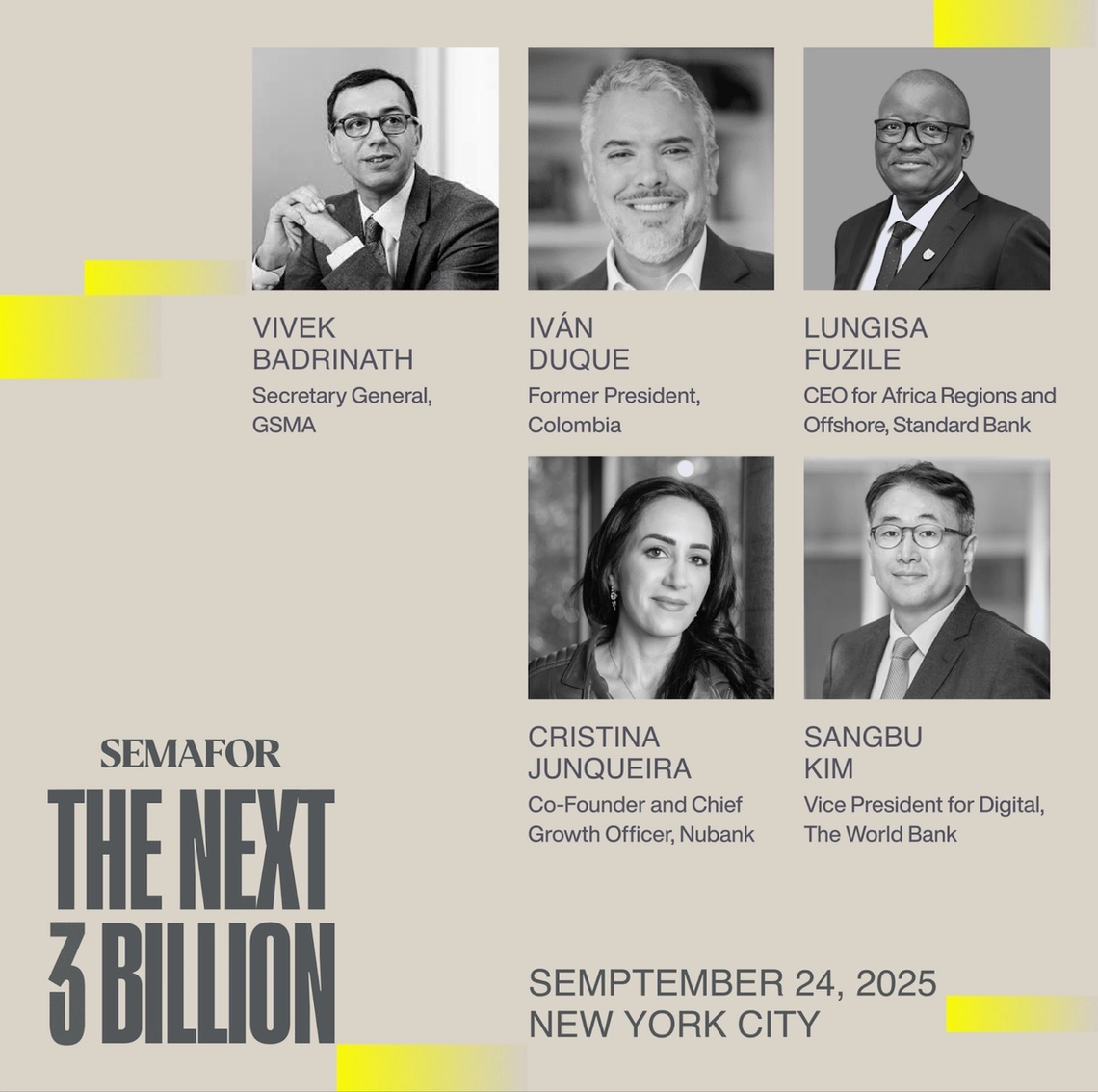 The next wave of global growth starts at The Next 3 Billion. Convening against the backdrop of the UN General Assembly, Semafor will host on-the-record conversations with Iván Duque, Former President, Colombia; Lungisa Fuzile, CEO for Africa Regions and Offshore, Standard Bank; Vivek Badrinath, Secretary General, GSMA; Cristina Junqueira, Co-Founder & Chief Growth Officer, Nubank; Sangbu Kim, Vice President for Digital, The World Bank; and more on the economic, social, and global impact generated by bringing the next three billion people online. Sep. 24, 2025 | New York City | Delegate Application |
|
|